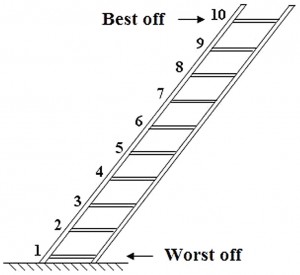Mark Fisher was a radical writer on cultural issues, based at Goldsmiths, University of London. An old article by Fisher has recently made me question the way that we measure socioeconomic status in our research. Here I lay out Fisher’s argument and suggest how it might be relevant to our work.
Earlier this month Mark Fisher, writer and cultural theorist, also known as his online alter-ego K-punk, took his own life. As news of Fisher’s death spread, I was directed back to read one of his 2014 articles, titled Good for Nothing. Here Fisher referred to his own experiences with depression, describing them as being embedded in the conviction that he was ‘literally good for nothing’. Fisher went on to argue that depression is not only framed by an individual, psychological context, but also the by the wider impersonal and political environment. Crucially, Fisher targeted class power in the UK for promoting feelings of inferiority in the ‘subordinate’ classes of society, by earmarking certain roles for the dominant groups, while at the same time projecting the empty message that anyone can be anything they want to be.
Fisher was unconvinced by the idea that individuals can be easily ‘liberated’ from their allotted ‘social spheres’ by the acquisition of qualifications or wealth. He mused that in our current society, those who move out of the ‘lower’ classes could be at risk of isolation and identity crisis, while those who are ‘left behind’ can be made to feel as though their poverty is their fault alone.
Whether or not you choose to subscribe to the entirety of Mark Fisher’s school of thought, socioeconomic status (SES) is an important consideration in psychiatric research. SES is the measure of an individual’s or family’s social and economic position in relation to others, typically based on measures of educational achievement, income, and occupation. One of the most robust findings in psychiatric research is that SES is inversely related to the prevalence of mental illness.
Having read Mark Fisher’s article Good for Nothing, I began to re-consider the way in which we measure SES in our research. I am currently working with members of the EDIT lab to design a new research study, to be conducted with a group of young adults around the age of 21. One aim of this study is to better understand how mental health problems run in families. In designing the study we have struggled with the question of how to best measure SES in such a young adult population.
“If you feel as though you are ‘inferior’ within society, does that mean that you should be classed lower on the scale of socioeconomic status?”
We expect that within our group of 21-year-olds there will be great variability in the degree to which individuals financially rely upon their parents, thereby making it difficult to draw an accurate picture of their financial situation. We also expect some to be working in occupations that they do not consider permanent, and some to be unemployed but not economically needing to work. Many of these 21-year-olds may also still be studying, and so will not have yet achieved the highest level of education that they expect to achieve. With all of these uncertainties in mind, it will be difficult to accurately describe each individual’s SES in the conventional way, by merely asking for their income, occupation and highest academic achievement.
One solution to our problem was to simply ask participants to rate their own socioeconomic status, or ‘perceived SES’. A way that this can be done is by presenting participants with the picture of a 10-runged ‘social ladder’ (see below), and asking participants to indicate the rung on which they feel they ‘stand’.

The MacArthur Scale of Subjective Social Status. Individuals are asked to indicate the rung on which they feel they stand, in terms of socioeconomic status.
Mark Fisher’s article lead me revisit this idea of ‘perceived SES’, wondering whether it is actually an important factor that is overlooked in more standard SES calculations that focus solely on concrete measures of educational achievement, income, and occupation. If you feel as though you are ‘inferior’ within society, does that mean that you should be classed lower on the scale of socioeconomic status, even if you score higher for educational achievement, income, and occupation – and vice versa?
For now, I think that my only conclusion can be that the psychiatric risk associated with feeling ‘inferior’ within society should be considered – and its importance can be given a sad nod by the untimely death of Mark Fisher. As yet, whether or not the ladder will be re-incorporated into our study remains to be determined.


